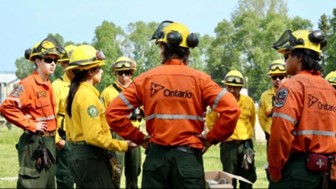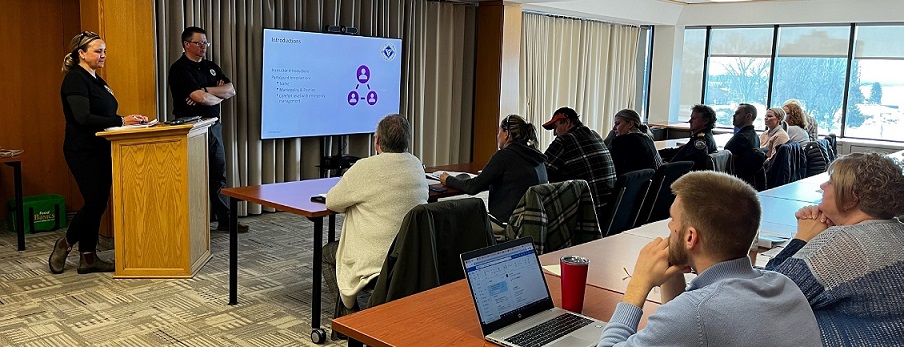A safe, practiced and prepared Ontario — 2023 Annual Report
Learn how we are building a stronger and more resilient Ontario.
Message from the Minister
The duty to ensure that our province is as strong and resilient as possible is both a great honour and serious responsibility. As the minister responsible for emergency management, I am pleased to release the first annual report for the Provincial Emergency Management Strategy and Action Plan, our province’s roadmap to move emergency management forward in collaboration with our partners.
The Provincial Emergency Management Strategy and Action Plan outlines a clear goal for emergency management for the province. This goal is simple: every person in Ontario should be safe, practiced and prepared before, during and after emergencies such as floods, wildland fires and threats like cyber security incidents. To this end, we have made substantial new investments, initiated new grants, and expanded training programs to ensure that emergency management partners across Ontario have the resources and tools necessary to prepare for, and respond to, emergencies.
Collaboration and coordination with emergency management partners, including municipalities and First Nations, have been integral in advancing the goals and actions within the plan. We are grateful for these valued partnerships and look forward to continuing to work together to move emergency management forward.
Together, we are ensuring Ontario is a leader in emergency management. We are applying the lessons we have learned from past emergencies to build a stronger and more resilient province. While new challenges emerge both rapidly and unexpectedly, ensuring the safety and wellbeing of the people and communities of Ontario is our highest priority.
Caroline Mulroney
President of the Treasury Board and Minister Responsible for Emergency Management

Message from the Commissioner of Emergency Management
The 2023 Annual Report: Provincial Emergency Management Strategy and Action Plan is the first annual report on Ontario’s comprehensive plan for emergency management. It outlines the numerous actions Ontario is taking with our partners to make sure that the province is always safe, practiced and prepared.
This report demonstrates Ontario’s leadership as the first jurisdiction in Canada to require annual and public reporting on progress made towards emergency management goals. It shows our dedication to transparency and accountability in the area of emergency management; a key part of our work because we know that safety is a priority for every person in this province.
We have worked hard to make Emergency Management Ontario the one window for provincial emergency management coordination. To do this, we are on the ground, 24/7, 365 days a year, building the relationships and earning the trust necessary to work with our partners in order to protect our communities. When it comes to safety, we are all in this together.
With continued collaboration and coordination, increased public education and strengthened planning, practice and response, we will continue to protect and prepare all Ontarians today and in the future.
Bernard Derible
Deputy Minister and Commissioner of Emergency Management
Treasury Board Secretariat

2023: A year in review
2023 marked an unprecedented year for emergencies in Ontario, including challenging flood and wildland fire seasons. Working with partners, Ontario continued to strengthen collaboration, planning and response to keep communities across the province safe, practiced and prepared.
3,519
people evacuated
86
deployments of Emergency Management Ontario staff for a total of 506 days
280
significant emergency incidents
28
local emergency declarations
336
emergency management courses delivered
13,847
emergency management course participants
823,000+
impressions made by Emergency Management Ontario public education social media posts
85
exercises and drills facilitated, observed and/or engaged in
546
engagements with emergency management partners and stakeholders
15
partnerships established with non-governmental organizations
development of a provincial incident Management Team ready to deploy to communities
Emergency management support provided across Canada
Deployment of Ontario emergency regional field services
For a detailed overview of progress on actions outlined in the Provincial Emergency Management Strategy and Action Plan, visit the Appendix.
Progress on goal 1 – One window for all Ontarians

Emergency Management Ontario continues to strengthen its role as the one window for provincial emergency management coordination through relationship building, collaboration, increasing resiliency and advancing preparation, mitigation and response strategies to ensure all of Ontario is safe, practiced and prepared.
Ontario’s initiatives at work in 2023 included:
Strengthened collaboration during coordinated responses to emergencies across the province, including floods and wildland fires. This included the safe evacuation, stay and return of 3,519 community members in 2023. To continue strengthening operational planning and preparedness after emergency responses, after-action report sessions were held with provincial, federal, municipal and First Nations partners following the 2023 flood and wildland fire seasons.
Advanced whole-of-Ontario coordination and preparedness for hazards by connecting partners with key resources and guidance to improve preparedness. During Cyber Security Awareness Month in October 2023, Ontario organized tabletop exercises to support incident preparedness, shared best practices through a provincial conference to build cyber resilience in the broader public sector and launched a specialized portal with interactive materials for students from kindergarten to grade 12.
Enhanced culturally appropriate and relevant emergency management training through the establishment of an advisory group with representatives from First Nations organizations from across the province.
For additional progress updates in 2023 related to Goal 1, visit the Appendix.
Moving forward
In 2024 and onwards, Ontario will:
- Continue to engage partners on opportunities to enhance the current emergency management framework in Ontario to support the province’s one window for Ontarians including roles and responsibilities and improving the quality of emergency management programs.
- Enhance collaboration by advancing the development of multilateral emergency management partnership agreements with First Nations communities, Indigenous organizations and federal partners. These agreements will pave the way forward for a First Nations-led emergency management framework that will position First Nations as equal partners in emergency management, support self-determination rights and ensure culturally appropriate and equitable emergency management services.
- Strengthen provincial coordination of preparedness and response to social emergencies, to mitigate events or situations that carry risk to human health and life, mental wellness, or to the social fabric and well-being of the community.
- Advance provincial collaboration and coordination, public education and planning and response for cyber security incidents.
Working together to keep Ontarians safe during the 2023 wildland fire season
The 2023 wildland fire season was a challenging fire season for Ontario. Seven hundred and forty-one wildland fires were reported, burning over 440,000 hectares across the province — almost three times more hectares than the 10-year average.
Through continued collaboration, the province’s emergency preparedness and response ensured that affected communities were kept safe during the evacuations, stays and returns of more than 600 First Nation community members.
In addition, Ontario deployed equipment and more than 600 fire management personnel to Alberta, British Columbia, Northwest Territories, Quebec, Yukon, Nova Scotia and Minnesota to support their firefighting efforts. In turn, Ontario received 104 fire personnel from Mexico, and specialized personnel from the Canadian Forest Service and the US Forest Service, as well as firefighting aircraft from Minnesota and the Northwest Territories.
To continue to improve and modernize how we fight wildland fires, Ontario is investing an additional $20.5 million in wildland fire management. This funding will be used to enhance fire suppression technologies, recruit new staff, enhance skills development, promote and maintain safety and build capacity to support Indigenous wildland fire management and community resilience.
Progress on goal 2 – Proactive planning and monitoring

Ontario continues to advance proactive planning and monitoring grounded in data, analytics and knowledge to set the foundation for coordinated emergency management across the province.
Ontario’s initiatives at work in 2023 included:
Implemented digital modernization efforts to enhance coordination, situational awareness, decision making and transparency with partners and Ontarians. This includes the development of the first-ever profiles of Ontario’s unincorporated areas for use by local and provincial emergency management partners that will help ensure the unique considerations and vulnerabilities in these areas are understood in advance of emergency incidents. The province also created a new paperless incident notification and management system that will enhance effectiveness and drive efficiency with emergency management partners.
Enhanced public education to help Ontarians to know their part in preparing for emergencies and that safety starts with having a plan. Emergency Preparedness Week is a national event that educates people and communities about the actions they can take to prepare for emergency situations. Ontario’s theme for the week was, “A Safe, Practiced and Prepared Ontario.” The province shared a series of refreshed and accessible materials with provincial, municipal and Indigenous partners to support their communities in practicing and planning for emergencies.
Supported emergency management partners with planning and exercises by reducing administrative burden through the launch of the “Exercise in a Box” program in 2023. This included sharing a collection of guidance documents and templates informed by subject matter experts to help partners meet annual emergency exercise requirements.
For additional progress updates in 2023 related to Goal 2, visit the Appendix.
Moving forward
In 2024 and onwards, Ontario will:
- Implement an emergency management public education strategy to improve Ontarians’ knowledge and awareness of relevant risks, hazards and personal preparedness best practices.
- Continue to enhance the use of innovative data, analytical capabilities and digital tools to support prevention, preparedness and response efforts, including the development of geographic and economic profiles for communities in Ontario. This will support emergency planning and preparedness activities through enhanced data about populations that are most vulnerable to top hazards.
- Continue implementation of a central resource hub for provincial, municipal and First Nations partners consisting of emergency management resources, best practices and other supports for emergency management programs in Ontario.
- Continue to modernize key emergency management courses in collaboration with partners to better serve Ontario’s diverse population.
Preparing for the 2023-24 respiratory illness season
Building on lessons learned from the COVID-19 pandemic, Ontario took comprehensive measures to build readiness and resilience for the 2023-24 respiratory illness season to keep Ontarians safe and healthy.
Across the province, Ontario continued to provide convenient access to tools, including vaccinations, antivirals, rapid antigen tests, emergency personal protective equipment (PPE), indoor air quality and virtual care options. Support was provided to higher-risk individuals, including residents of long-term care and retirement homes, and to strengthen measures for resilient healthcare workforce capacity.
As well, the province worked collaboratively with health and non-health partners, including retirement homes, congregate living settings and school boards, to support preparedness through efforts such as tabletop exercises, information sharing, readiness assessments and shared reporting tools.
Progress on goal 3 – Practiced and prepared emergency response

The province is working to ensure that Ontarians are practiced and prepared for potential future emergencies through strengthened local capabilities, emergency management training, exercises and public education.
Ontario’s initiatives at work in 2023 included:
Strengthened emergency practice and preparedness through leading and/or participating in more than 85 emergency exercises and drills involving the federal government, municipalities, broader public sector organizations, non-governmental organizations and the private sector. These exercises focused on planning, preparedness and response for various hazards, including transportation incidents, cyber security, critical infrastructure and nuclear preparedness.
Introduced the Nuclear Enhancement Program to support designated municipalities with planning and preparedness in the unlikely event of a nuclear incident.
Advanced whole-of-Ontario planning and response through the launch of the Provincial Exercise Program, a multi-year plan to exercise, test and strengthen multi-sector emergency plans and whole-of-government emergency response. The first provincial priority exercise, set to take place in 2024, will test and strengthen the provincial response to an extreme heat emergency.
For additional progress updates in 2023 related to Goal 3, visit the Appendix.
Moving forward
In 2024 and onwards, Ontario will:
- Partner with non-governmental organizations to support local emergency preparedness and response to enhance the province’s emergency response capabilities.
- Implement tools to help rapidly identify community needs in an emergency and better facilitate the mobilization of supports and coordinating efforts across various response agencies.
- Host more cross-government exercises, including the first provincial priority exercise in 2024.
- Enhance provincial emergency management coordination to respond to emergencies by continuing to review and update provincial emergency management plans.
Building emergency preparedness and response capacity across Ontario
In the 2023 Ontario Budget, the province committed $110 million over the next three years to fund, train, coordinate and improve Ontario Corps and the province’s emergency preparedness and response.
As part of this funding, the province is establishing partnerships with non-governmental organizations to strengthen local emergency preparedness and response capacity across the province.
This funding was also used to create the Community Emergency Preparedness Grant, an investment of $5 million to help ensure communities across the province have the resources and equipment they need to prepare for natural disasters and emergencies. The grant helps communities and organizations purchase critical supplies, equipment and deliver training and services to improve local emergency preparation and response.
Building on the success of the COVID-19 Volunteer Portal, the portal was enhanced as part of the Ontario Corps program and includes a Volunteer Registration and Partner Portal. Provincial ministries, municipalities, First Nations communities and non-governmental organizations in need of emergency support can use this database to access registered volunteers.
Best practices from across Ontario
First Nations-led initiative: Weenusk (Peawanuck) First Nation-led Wildland Firefighter Training: Weenusk First Nation coordinated and hosted a regional SP100 Forest Fire Training course in community, strengthening partnerships, preparedness and emergency management capacity for wildland fire management. Through this initiative, Weenusk First Nation, along with Fort Severn, Fort Albany, McDowell Lake and Keewaywin were trained on wildland fire preparedness, fire risks, safety measures and fire suppression activities. This initiative was supported by partnership with Nishnawbe Aski Nation, Keewaytinook Okimakanak and the Ontario government.
First Nations-led initiative: The Independent First Nations Alliance (IFNA) Integrated Emergency Services Fire Rescue Remote Exercise: In November 2023, the Independent First Nations Alliance and Lac Seul First Nation partnered to host a collaborative fire rescue exercise to support emergency preparedness. The exercise included a simulated downed aircraft, which provided functional testing and validation of the various emergency management capacities IFNA has been building in collaboration with partners since 2019 as the first Indigenous-led emergency operations centre in Northern Ontario. This exercise included simulated operational procedures such as responding during a power-outage, real-time video monitoring, and the use of Remotely Piloted Aircraft Systems to support search and rescue. The exercise strengthened collaboration and coordination among partners, leveraged best practices and identified opportunities for enhanced Indigenous-led emergency management approaches.
First Nations-led initiative: Wabigoon Lake Ojibway Nation Emergency Exercise: In October 2023, Wabigoon Lake Ojibway Nation held an emergency exercise for the community’s emergency responders and partners to test collaborative efforts and the effectiveness of response, preparedness and communication procedures to reduce the severity of loss in a potential emergency.
Municipal-led initiative: Geospatial Analysis of Critical Infrastructure and Community Features: Municipalities, including the City of Toronto, City of Cambridge and County of Brant, have adopted geospatial technology to map critical infrastructure, potential hazards and community features to inform situational awareness.
Community-led initiative: Emergency Food Plan for Thunder Bay: The Emergency Food Plan for Thunder Bay is a collaborative civil society development, led by the Thunder Bay + Area Food Strategy, to complement the City of Thunder Bay’s Emergency Plan. The Emergency Food Plan addresses the challenges related to food access and its impacts on health and wellbeing during emergency events, with a particular focus on vulnerable populations. The plan does this through identifying potential hazards and risks to food access so to enable better preparation and response in the event of an emergency.
Non-governmental organization-led initiative: Team Rubicon Canada in Northern Ontario: Team Rubicon Canada is a veteran-led humanitarian organization that serves communities before, during and after disasters and crises. In May 2023, Team Rubicon Canada supported the provincial response to a critical flooding situation in northern Ontario by rapidly mobilizing a team of volunteers to the community to gather necessary information and intelligence. Their collaborative, quick and skilled deployment supported strategic next steps and tactics to support the community when they needed it most.
Appendix: Key progress on the goals and actions in the Provincial Emergency Management Strategy and Action Plan
Goal 1 – One window for all Ontarians
Strengthen Ontario's governance and accountability by establishing an action-oriented one window for provincial emergency management coordination
- Strengthened provincial emergency management coordination and response, including whole-of-government planning for respiratory illness, flood and wildland fire season.
- Enhanced provincial governance and accountability through planning, information sharing and collaboration across provincial ministries on key, topical and emerging emergency management issues, risks, hazards and strategies through the Deputy Ministers Steering Committee on Emergency Management and the Cabinet Committee on Emergency Management.
- Connected cyber security experts and partners to advance emergency management and cyber security approaches in Ontario through distributing resources to partners and through a joint roundtable hosted by Emergency Management Ontario and the Ministry of Public and Business Service Delivery in July 2023.
- Strengthened operational planning for emergency management in Ontario by facilitating two after-action report sessions in Cochrane and Thunder Bay following the 2023 flood and wildland fire seasons.
- Collaborated across provinces and territories, federally and internationally on emergency management, including:
- Collaborating with federal, provincial and territorial governments on approaches and strategies for emergency management across the country.
- Participating in the Radiological Assessment System for Consequence Analysis Summit designed to support and enhance cross-border nuclear emergency response.
- Advancing relationships with partners in the US including the Federal Emergency Management Agency through opportunities for mutual collaboration and growth.
- Began work with Indigenous Services Canada to move towards multilateral emergency management service agreements with First Nations partners, to position First Nations communities as equal partners in emergency management, support their self-determination rights and ensure culturally appropriate and equitable emergency services.
Ensure the unique needs of vulnerable populations are considered throughout the emergency management cycle
- Developed the First Nations evacuation decision support tool, which provides First Nations communities with steps for consideration on whether to stay and shelter in place or evacuate during an emergency.
- Formed the Basic Emergency Management Advisory Group, including representatives from First Nations organizations, to make emergency management training for emergency management personnel more culturally appropriate and relevant for Indigenous partners .
Increase clarity of Ontario's emergency management approach and structure and reduce administrative burden for emergency management partners
- Coordinated across provincial ministries to support readiness and monitoring for seasonal respiratory illness for the health and non-health sectors.
- Reviewed emergency management program evaluation approaches to explore opportunities to improve the quality of emergency management programs across Ontario.
- Reduced administrative burden on ministries and municipalities by providing resources to support meeting annual exercise and other emergency management program requirements.
Goal 2 – Proactive planning and monitoring
Use data and knowledge to inform emergency management decisions
- Implemented digital modernization efforts to enhance coordination, situational awareness, decision making and transparency with partners and Ontarians including:
- Developed the first-ever profiles of Ontario’s unincorporated areas for local and provincial emergency management partners.
- Created an online Situational Awareness Portal, which is a new paperless incident notification and management system, that will enhance effectiveness and drive efficiency by providing access to near real-time situational awareness for emergency management partners.
- Established a First Nations All Hazards Working Group, co-led by the First Nations Emergency Response Association, focused on integrating Traditional Ecological Knowledge in emergency management practices that support communities in becoming more resilient before, during and after emergencies.
Proactively identify the likelihood and impact of risks in the province
- Continued planning to renew the Hazard Identification and Risk Assessment program in 2024 to inform provincial hazard preparedness, monitoring and response efforts and increase resiliency.
Identify, support and develop provincial capabilities for top provincial hazards
- Identified provincial capabilities ready to deploy to support community responses to emergencies, including provincial team members and volunteers available within 48 hours through non-governmental organization partners.
- Implemented enhanced planning requirements for provincial ministries to identify, monitor and report to Emergency Management Ontario on emerging risks and hazards, and the readiness of the resources, goods and services needed to respond.
- Supported capacity building in critical resources (supplies, equipment, people) and strengthened supply chains related to pandemic and health emergency preparedness.
- Continued to lower supply chain risk and support economic development through ongoing strategies related to the provincial stockpile by Supply Ontario.
Develop support resources for emergency management partners
- Launched the “Exercise in a Box” program to support municipal and provincial ministry partners with conducting mandatory annual emergency exercises.
- Launched an agency instructor certification pilot to accredit more training course instructors and reduce administrative burden for partners.
- Continued to update emergency management courses, including working with First Nations partners to ensure materials are culturally appropriate.
- Launched refreshed and accessible public education materials during Emergency Preparedness Week for the public and emergency management partners.
- Developed and distributed resource materials on key topics, including emergency management and cyber security.
- Developed a centralized digital platform for Emergency Management Ontario and provincial ministries that includes resources, tools, supports and best practices for emergency management.
Goal 3 – Practiced and prepared emergency response
Implement a Provincial Exercise Program and review, update and create new provincial emergency response plans
- Facilitated, observed, and/or participated in 85 emergency exercises and drills.
- Launched the Provincial Exercise Program, which includes a multi-year plan to exercise, test and strengthen multi-sector emergency plans and whole-of-government emergency response.
- Led tabletop exercises in northern Ontario ahead of the 2023 flood and wildland fire seasons.
- Introduced the Nuclear Enhancement Program to help designated municipalities prepare for nuclear emergencies.
- Enhanced collaboration and coordination between provincial ministries related to continuity of government operations to ensure the rapid resumption of provincial time critical services during widespread disruptions.
Enhanced provincial surge capacity through Ontario Corps
- Announced $110 million as part of the 2023 Ontario Budget to fund, train, coordinate and improve Ontario Corps and the province’s emergency preparedness and response.
- Advanced work on establishing a northern hub pilot, which will provide a space for training, exercises and collaboration with partners as well as an Emergency Operations Centre.
- Partnered with non-governmental organizations to enhance capabilities to support emergency preparedness and response including building volunteer readiness across the province.
- Launched the Community Emergency Preparedness Grant to help communities and organizations purchase critical emergency equipment and supplies to enhance local emergency capacity and response.
- Established a provincial Incident Management Team ready to deploy to communities to support incident responses across the province now and in the future.


















